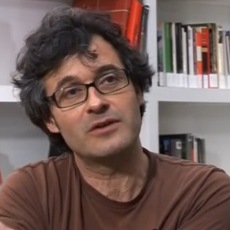Pompeu Fabra University, the first University in Spain to become a member of the Kadenze platform of MOOC courses
Pompeu Fabra University, the first University in Spain to become a member of the Kadenze platform of MOOC courses
UPF is expected towards the end of 2016 to offer “Creating Interactive Audio Using Pure Data", a course that focuses on the field of musical technology, directed by Sergi Jordà, professor with DTIC-UPF.
 Pompeu Fabra University is a new member of Kadenze, a platform of massive open online courses (MOOC) specializing in creative art and technology, that includes some of the world’s most prestigious centres and universities in this field.
Pompeu Fabra University is a new member of Kadenze, a platform of massive open online courses (MOOC) specializing in creative art and technology, that includes some of the world’s most prestigious centres and universities in this field.
UPF, which becomes the first (and only) centre of the Spanish State to belong to it, is expected towards the end of 2016 to offer “Creating Interactive Audio Using Pure Data”, a course that focuses on the field of musical technology.
This new MOOC, which will be added to the existing offer at UPF, will be directed by Sergi Jordà, professor with the University’s Department of Information and Communication Technologies (DTIC), who will enjoy the support of Miller Puckette, professor of the Music Department of the University of California, San Diego.
An ideal course to start experimenting with interactive audio applications
“Creating Interactive Audio Using Pure Data” will provide a comprehensive introduction to interactive audio programming using the Pure Data (Pd) programming language, a free open-source visual programming environment, related to the Max/MSP, and especially suitable for the creation of interactive audio applications.
This environment provides easy access to a wide range of sound generation and processing techniques, as well as the ability to use the input of sensors, multitouch devices, laptops, MIDI, and to have communication and control via local and remote networks, without the need to write lines of code.
The Pd program is especially designed to make it easy to use for the beginner, but is also suitable for the experienced user. It allows you to start to develop sound immediately, without having to have extensive knowledge of complex mathematics or coding, and to become initiated in experimentation with computer-generated music, creating musical instruments, audio plug-ins or the design of interactive sound facilities.
This course will include a system of evaluation of small tasks of increasing complexity and a final project. Some of the aspects that will be reviewed, on the basis of practical examples, will be the foundations of digital sound and progress through the intricacies of sound generation, processing and control, with special emphasis on audio oscillators, filters, sensors, samplers, MIDI, and OSC protocol, among other contents.
Expert en tecnologia musical i un dels creadors de la Reactable
Sergi Jordà is a lecturer with the Department of Information and Communication Technologies (DTIC) at UPF, where he teaches computer music classes, human-computer interaction (HCI) and art and interactive media. In the field of research, he is a member of the Music Technology Group (MTG) and directs the DTIC’s Music and Multimodal Interaction Lab (MMI-Lab). Currently, his main areas of research focus on the confluence of HCI, tangible, musical and physiological interaction, and on the creation of tools to make and promote music.
He has received several international awards, including the prestigious Ars Electronica Golden Nica Award (2008). He is one of the creators of the Reactable, an interactive instrument that achieved great popularity after being integrated by the Icelandic artist Bjork in her 2007-8 world tour. Sergi Jordà is one of the co-founders and current managing director of the company Reactable Systems.
Kadenze, a pioneer MOOC platform in the field of art and design
Kadenze is a global platform, with offices America, Asia and Europe, launched in June 2015. The aim is for it to become an innovative bridge connecting students with educators, artists with engineers of the major universities around the world, to provide advanced level degrees and improve talent in the fields of art, design and creative technology.
It currently includes more than a score of associated centres such as the universities of Princeton, Stanford, the Ringling College of Art and Design in Florida, the Pratt Institute in New York, the Paris College of the Arts, the University of London’s Goldsmiths, the Seoul Institute of the Arts, the University of Saint Joseph Macau (China) or the National University of Singapore, in addition to UPF, who joined the platform through an agreement promoted by the Center for Learning Innovation and Knowledge (CLIK).

